From the Editor
The United Nations set forth the Responsibility to Protect two decades ago in a blush of long overdue enlightenment: it offered a new norm to stem the tides of genocide, war crimes, crimes against humanity, and ethnic cleansing. Greeted with global acclaim, “R2P” was recognition of the urgent need to buttress international law and end impunity.
That same R2P, which only a few years ago enjoyed America’s full-throated support, is now being declared stillborn by the actions of that same sponsor, the United States. President Biden’s unilateral decision to back Israel’s unhinged aggression against trapped civilians may go down in history as the strategic blunder that cost America its already shaky standing as a guardian of the Rule of Law. As the death toll in Gaza went from hundreds to thousands to tens of thousands, with no sign of letting up, the US government may as well have been ordering mass graves not only for Palestinians, but for international law itself. World leaders (with the noteworthy exception of South Africa) stood by and accepted this new normal: the responsibility to protect is apparently no longer their job.
As for the subjects of those failed leaders (i.e., We, the people), on our watch the children of Gaza were murdered en masse and journalists and medics were singled out and mown down in numbers that made a mockery of the Geneva Convention. UN workers who were forced to flee to “safety” died in that same rubble, unprotected by their blue helmets and UNRWA vests. IDF censors kept the media out and away from Rafah, Khan Younis, and Gaza City, while the management at CNN issued directives on how to tell the story; over at the New York Times racist tropes were published that would have made even Kipling raise an eyebrow. The human subject – the woman in Gaza, the fatherless child – was rendered so un-human that the reader would at last be forced to surrender. When the inevitable blowback began, and Americans overwhelmingly sought immediate ceasefire, the White House doubled down, public opinion be damned.
One day, insha’allah soon, after the last American-made 2000 lb. bomb is dropped and the dust settles and the people of Gaza bury their dead, only then will the world take stock of the destruction. It will be unmistakable irony that Benjamin Netanyahu, who can’t see beyond his own self-interest, is more attuned to the transcendent importance of Palestine than the White House. In fact, the whole rest of the world understands that Palestine is a vital organ in our 21st century body; the United States stands alone in its inability to recognize the Occupation as the cancer which, as 10/7 made clear, may be life-threatening to us all.
Gaza’s loss of life comes at the hand of Israel’s particularly indiscriminate aggression; for this, Palestinians may never forgive. As South Africa pointed out at the ICJ, eliminating Hamas was Israel’s secondary priority, a fig leaf for ethnic cleansing. The United States must effect a ceasefire as its first priority, before turning to our moral and legal obligations to rebuild the schools, hospitals, libraries, and homes that were destroyed by American bombs. After all, when President Biden offered Israel a blank check, he knew that whatever Israel would break, America would buy. If in Gaza our Responsibility to Protect is a thing of the past, our Responsibility to Pay is the bare minimum for our future.
Nicholas Griffin
Executive Director
Reflections on Gaza:
The Day After
With Israel’s ongoing genocide in the Gaza Strip, as well as increased violence by Israel and Jewish settlers against Palestinians in the West Bank, East Jerusalem, and inside Israel, it is difficult to ponder, let alone comprehend a “day after” for Palestinians. Certainly, in the midst of such dizzying violence and inequity, it is hard to overstate the peace and justice they have been denied.
AMEU reached out to past Link authors and others to reflect on what a day after could mean or bring, or how Palestinians and their interlocutors are deliberating on it. Below are several very brief reflections shared in December and January from thinkers, activists, and professionals who consider trauma and grief, politics and brutalities, what it means to stand up for Palestinian rights in the United States at this time, and the possible unraveling of the international order. We share these thoughtful and at times provocative interventions in hopes of spurring processes that seek equal rights and security for all who live between the river and the sea.
Col. Larry Wilkerson
Col. L.B. Wilkerson is the former chief of staff to Secretary of State Colin Powell.
Today, the Christmas season of 2023, as Pope Francis has described, enfolds anything but a Christ-like world. Were Christ with us today, his tears would be, as was said of Cambodia under the rule of the Khmer Rouge, lagrimas caudales—hot indeed.
His most scalding tears would be for Gaza, where the Israelis are slaughtering the Palestinians by the tens of thousands, Old Testament style—children, women, hospital workers, journalists, United Nations staff, and anyone unfortunate enough to be caught under Israel’s U.S.-supplied bombs or artillery rounds. Meanwhile, U.S. leaders are replete with platitudes and promises while they support to the hilt the massacre. Fittingly, Israel’s Nazi-like leader, Benjamin Netanyahu, quotes ancient scriptures as he pursues relentlessly what has been his goal since assuming power: the complete and utter eradication of an entire people. Jesus Christ himself must know that the Pope, Christian pastors in Bethlehem, indeed true Christians worldwide, weep alongside Him.
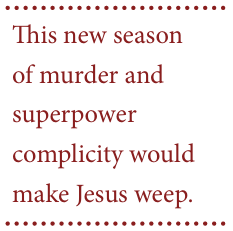
The Chief of the Israeli General Staff General Herzi Halevi opines that “Israel acts wherever it has to…,” meaning any ground between the river and the sea where Palestinian people are present is fair ground for two-thousand-pound bombs dropped by murdering cowards in airplanes. Cowards just like the Israeli sniper Pope Francis called a terrorist because he shot a mother and daughter seeking shelter from the bombing.
Nearly two million people are sheltering in south Gaza, having been directed to go there while Israel bombed mercilessly the north. Now the bombing has moved to the south—and even there, people are told to move to certain places in the south, presumably for their safety, and then those places and people are bombed, too. Meanwhile, that journalistic flagship of Israeli support inside the United States, the august and imperious New York Times, reports that “some of Israel’s allies, and even former Israeli officials, are growing more skeptical that it will be possible to completely eliminate Hamas,” Bibi Netanyahu’s stated goal. For once, someone in ostensible authority is absolutely correct. An idea cannot be defeated by bombs, bullets, and bayonets, only by another idea, more powerful than it. But Bibi has already defeated that other idea—a truly democratic state in the Middle East called Israel.
Yes, this new season of murder and superpower complicity would make Jesus weep indeed.
(Dec. 27, 2023)
Stathis Gourgouris
Stathis Gourgouris is a poet, essayist, sound artist, and Professor of Comparative Literature and Society at Columbia University. His latest book, Nothing Sacred, is published by Columbia University Press (2024).
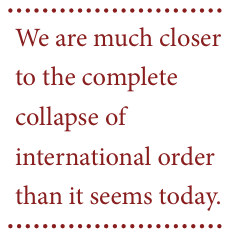
The day after in Gaza is at this point not quite even visible. The remnants of genocidal annihilation of all social life—as a result of carpet bombing that puts to shame Nixon’s bombing of Cambodia—are at this moment conceptually incomprehensible. Apart from the fact that this raises insurmountable problems of rebuilding at a concrete practical level, we have a psychological humanitarian devastation of unprecedented scale that permeates every aspect of a society. Whole lines of families eradicated, leaving behind not a single relative, are debilitating attacks upon the very notion of generation, of time itself. How can the notion of the future have any meaning in these terms?
Moreover, from the Israeli side of things a permanent condition of war—under the perverse discourse of security—is perfectly visible. From this standpoint, the only solution would be the total clearing out of the land, as if by magic. I realize this may seem an extreme picture, but it is not. It certainly occurs in the realm of feasible fantasy for many Israelis, including people holding posts in the current government.
So, from any worthy standpoint of social science policy, the idea of “the next day in Gaza” is perfect unreality. It cannot happen, because in order for it to happen, everything that has happened has to be reversed, as if by magic. We all know magic does not occur in human history, hence the brutality of visions of annihilation. Hence also the epistemological void we face at the prospect of “the next day in Gaza.”

If for the sake of argument we could seriously envision “the next day in Gaza” as a fact, then the very first and absolute priority must be no Israeli settlement—not even an inch of ground. About this there must be no compromise. Alas, plans of settlement, which would in fact divide the strip into five sections, already exist with actual mapping. So, the primary responsibility of the international community would be to prevent—by any means necessary—Israeli settlement. Given the perfect failure of the international community to prevent this catastrophe, I cannot imagine this is possible.
Ideally, all control of Gaza should be turned over to the Palestinians. Whether we like it or not, they deserve to run their society as they please—as all societies deserve. But knowing this is not even discussable at this point, the second and necessary element would have to be control of the region—including military and security control—to be turned over to the United Nations. This would have to include the billions necessary to rebuild a society, infrastructure and superstructure, whatever the cost, which must be forwarded by the Great Powers that enable Israel to conduct this catastrophe unimpeded. This too would have to be handled by the United Nations. But, again, given the perfect failure of the United Nations to put a stop to this catastrophe, I cannot imagine this is possible.
What I can imagine perfectly well is a world unlike anything we have known since the end of WWII and the nuclear bombings of Japan. A complete collapse of international order. We are much closer to this becoming a reality than it seems today, and we are way past any moral boundaries that would guarantee humanity a livable future.
(Jan. 10, 2024)
Tom Suárez
Tom Suárez is a violinist, composer, historical researcher, and author of several books, including Palestine Hijacked (2022). He is a native of New York and resides in London.
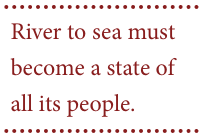
There is a reason why we are perennially expected to swear allegiance to Israel’s so-called right to exist. The reason is that any honest appraisal of Israel would demand the opposite—that the state has never had any such right to exist and must be dismantled. Since honest reckonings with Israel cannot be stopped, the voicing of their inescapable conclusion must be forbidden.
And so in obeisance to the great taboo, we deflect. We instead rail against what we mysteriously call “the occupation.” We rail against the apartheid, against the ethnic cleansing, against the genocide. We protest that Israel needs to stop these crimes. For 76 years, we have treated them as errors of the state, rather than what they are: the very purpose for which the state exists.
That singular, unwavering purpose—explicitly planned by Israel’s architects—is and always has been to replace the Palestinians with an imported, ethnically-predicated population.
When Israel tells us that it is “the Jewish state” we are expected to embrace the term as something venerable, indeed something to be defended. Yet the cynical term has always hid the starkly different truth in plain sight: that Israel defines Jews in racial terms and exists to forge a pure “Jewish” [sic] supremacist state river to sea. Thus Israel’s very raison d’être requires that marriage in Israel between the “races” (Jews versus non-Jews, as defined by the state) is illegal, requires that it kill or expel non-Jews river to sea, requires that it erase Palestinian cultural identity by hijacking it as its own.
We cannot simultaneously accept Israel’s “right to exist” and campaign for it to stop its crimes. If we accept this alleged right to exist, we have endorsed those crimes. We are the doctor bemoaning the disease’s ravages while obeying orders to swear fealty to the disease itself.
As citizens of the nations that created and perpetuate the Israeli state—above all the United States and Britain—demanding its dismantling is our moral obligation. River to sea must become a state of all its people, with a warm welcome for the millions that Israel has kept in internment (“refugee”) camps because they are not Jewish.
This begins by breaking the great taboo.
(Dec. 28, 2023)
Nora Lester Murad
Nora Lester Murad is a writer, educator, activist, and award-winning author. She is a Policy Member of Al-Shabaka, and can be reached through her blog at http://www.NoraLesterMurad.com.
“There won’t be a ‘day after’ this genocide,” a friend in Nablus tells me on Signal. “The bombing may stop, but the project to erase Palestinians will persist in one form or another until Israel either wins or loses.”
True. We are in an existential fight against White Empire, and it won’t end just because Israel needs a bathroom break.
As an anti-Zionist Jew, it is crystal clear to me that if the Jewish supremacist colonial regime of Israel wins, both Palestinians and Judaism will be annihilated. Since I married a Palestinian and have Palestinian daughters, my mama bear energy is fully invested in the scenario where we all live together in equality with dignity, rights, and security for all.
But first, we must stop this goddamned genocide.
Like everyone, I’m running 24/7 with the heavy, sharp pieces of my broken soul dragging behind. Contemplating the “day after” feels like a Herculean task of acumen at a time when I can barely fathom reality.
Today, a friend in Rafah texted me on WhatsApp that he was depressed. What could I say? I replied,

Coming from someone who takes a hot shower every day, it sounds ridiculous. If I see him again when this is over, how will I look him in the eyes? I am overcome with shame about my powerlessness while he literally protects his small children with his body.
Yesterday another friend called me on Messenger from Khan Younis, chaos in the background. His daughter said, “Auntie, please tell Baba not to make us walk to Rafah.” My friend explained they are being forced to move from their shelter. He can’t afford a donkey cart, so the family of eight would have to go on foot, carrying whatever belongings they have left.
I didn’t know what to say.

Before this genocide, I stood on one side of a huge chasm. On my side were people who cared about houselessness, mass incarceration, discrimination, censorship. But many of those people have since planted “I Stand with Israel” signs on their lawns. I am dumbfounded! How can intelligent, decent people argue against a ceasefire? If it was wrong for 1,200 people to be killed, then isn’t it also wrong to kill 25,000?
How will I continue to work for social justice when I have lost faith in people?
Yet there are people who care:

When I read this tweet to my grownup daughter, her response surprised me. “What the fuck is the point of apologizing?” she erupted. “Palestinians never asked for pity.”
But I am sorry, I tell her. I’m so sorry. I’m so very, very sorry.
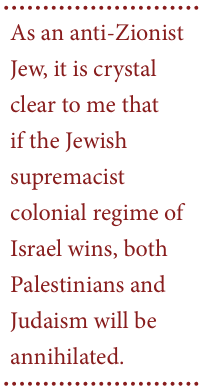
She says that like the woman of color in Samer’s tweet, my pain is from empathy not sympathy. “It’s happening to you too, mama,” she consoles, and I am momentarily relieved. But seconds later, an old colleague sends me photos of the shelter in Nuseirat camp. Feces is everywhere, and there is no water to clean up. How can I face her on the “day after” when all I have are empty platitudes like “May God protect you and keep you?”
My daughter reminds me that faith is inextricably ingrained into the Arabic language. The culture of collective care is upheld in every phrase. The idioms and invocations are not platitudes, she explains patiently. They manifest our hopes for others. The obligatory response, which is nearly always “praise to God,” shows how gratitude breeds strength. “Even during a genocide, every hard day lived is a privilege,” she tells me.
“Never hesitate to look them in the eye and reassure them, even though their wellbeing and liberation are not in your hands,” she says.
I nod, and I’m sure she feels my commitment across the long-distance phone line.
Because no matter what I do or don’t do, on the “day after,” whenever it comes, Palestinian steadfastness will be stronger than ever. And if my faith falters, my friends in Gaza will reassure me.

(Jan. 3, 2024)
Robin D.G. Kelley
Robin D. G. Kelley is a Professor of History at UCLA and author of several books, including Freedom Dreams: The Black Radical Imagination. He also serves on the Advisory Board for Palestine Legal.

In the immediate aftermath of October 7, anyone who dared to use the word “genocide” to characterize Israel’s so-called war on Gaza faced reprimand, reprisals, and silencing, or was accused of “incitement”—and here I’m speaking of American universities, the purported havens of critical engagement and free thought. Student groups calling for a ceasefire and demanding that we tell the truth about Israeli violence and U.S. complicity have been suspended, their members doxxed and disciplined by liberal academic leaders, and those same leaders have been disciplined by the very government financing this genocidal war for not doing more to crush students standing up for Palestinian life. And while this madness continues, the rest of the world has come around to naming this a genocide. Massive protests led by groups such as Jewish Voice for Peace, IfNotNow, and others suggest that the tide may be turning. South Africa’s compelling case against Israel for violating the UN Convention on Genocide before the ICJ is an important breakthrough.
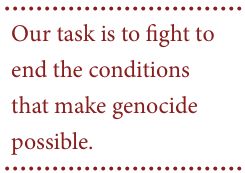
I am optimistic but realistic. The suppression of truth on our campuses has only intensified, as Biden’s Department of Education is preparing to investigate antisemitism on various college campuses—including my own (UCLA). The ICJ has heard the case as well as Israel’s rebuttal, and I have no doubt the court will rule against Israel, but the ruling is years away and is non-binding. Meanwhile, the death toll in Gaza is about to exceed 24,000 with at least 7,000 unaccounted for. Among the dead are about 10,000 children, over 5,000 women, 110 journalists, and countless writers, scholars, artists, university administrators, and so forth. So we are faced with the question Noam Chomsky asked in 1967 with respect to the Vietnam war: What is our responsibility as intellectuals in the face of genocide? Is it to engage in interminable debates over the definition of genocide, or to parse the fine distinction between genocide and war crime? Is it merely to demand a ceasefire and hope for the best?
Our task is to fight tirelessly to end the conditions that make genocide and the ongoing Nakba possible. We must continue to fight relentlessly to end the occupation, dismantle all vestiges of apartheid, hold Israel accountable for war crimes, end the use of administrative detention, the jailing of minors, and political repression, free all prisoners, ensure all Palestinians a right to return as stipulated by UN Resolution 194, as well as the restoration of stolen property and fair compensation for one of the greatest colonial crimes of the twentieth century, and for those of us living in the belly of the beast, we need to liberate the U.S. from the grip of Israeli colonialism—end all funding to Israel now. We have to support the divestment campaign and force our universities and related institutions to stop investing in apartheid and war; we need to go after the real beneficiaries of this genocidal war: Hewlett Packard, Lockheed Martin, Northrop Grumman, General Dynamics, Raytheon, and the like.
And finally, our responsibility as intellectuals is to always speak truth to power, not as isolated, vulnerable individuals but collectively so as to protect each other. As I write these words on Dr. Martin Luther King, Jr.’s 95th birthday, I can hear King’s words echo in my head that “truth is the first casualty of war.” He was repeating Republican Congressman Hiram Johnson who said the same thing on the House floor the day the U.S. dropped the first atomic bomb on Hiroshima. But I do not entirely agree. Truth isn’t really a casualty of war—it is wounded but always recovers. We saw truth rise again after Vietnam, after Chile, after Indonesia, after centuries of genocide and slavery. But how many had to die before truth prevailed? Every act of complacency and cowardice increased the death toll. We have to speak the truth, demand ceasefire now, and fight to end the occupation, no matter the cost. The question we must ask ourselves is: How will history judge us?
A poem in a difficult time
is beautiful flowers in a cemetery.
– Mahmoud Darwish
(Jan. 14, 2024)
Dr. Alice Rothchild
Dr. Alice Rothchild is a retired medical doctor and acclaimed author of young adult fiction, including in 2023 Finding Melody Sullivan and Old Enough to Know. Dr. Rothchild is presently collaborating on an educator’s guide for Palestine at www.alicerothchild.com.
When asked what will happen the day after this current war on Gaza is finished, I couldn’t imagine because I have no sense of the endgame for the Israeli military. Will the north become a no-go buffer zone? Will Gazans in the south stay or will they be driven into Egypt? What will be the international humanitarian and legal responses? What kind of Palestinian resistance will persist or develop? As I am deeply involved in honoring and uplifting voices from Gaza, the one thing that is abundantly clear to me is that this is and will be a deeply traumatized population.
The first morning when no fighter jets fracture the battered landscape and the sky is blue/grey, the dawn quiet except for birdsong and the lapping of Mediterranean waves, trucks will line up at the perimeter checkpoints loaded with food, water, medications, and fuel. UN troops will buffer the ceasefire. Officials will pontificate about terrorism, proportionality, and collective punishment; lawyers will gather at the International Criminal Court and the international gaze will turn away. The people of Gaza will wake up in in their overcrowded apartments and bombed-out schools, chilly tents, and rough makeshift shelters—some still in Gaza, some in the Sinai, some harbored in distant countries—and their collective grief and trauma will build into an enormous howl of pain, loss, and mourning.
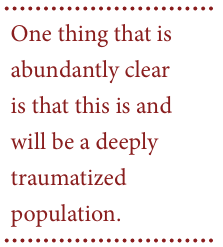
Their first steps outside on that morning will be tentative and distrustful, accompanied by anxiety and disbelief that the hell of war and the smell of sudden, random death has really ended. The first day will be a time to search for the loved ones still decaying under the rubble, to count the dead, to embrace the living, to hold the children who are too hungry, too frightened to remember the time before. Some Gazans will corral their grief into action, digging their hands into shattered concrete, searching for books, clothes, and treasures in the rubble, standing in line for food, carrying jerry cans of water. Some will be lost in a paralysis of the spirit and the mind, unable to crawl out of the darkness. No one will ever be the same.
On that first day of mourning, the victory of survival will feel bittersweet and the burden of repeated killings, displacement, injury, starvation, and despair will grip the collective consciousness as families begin to grapple with the emotional and spiritual damage that will mark their lives forever. They will be haunted by incessant bombing, the screech and boom, shaking earth, windows breaking, clouds of choking grey dust. By the memories of dismembered arms and legs, the stench of unwashed bodies, the itch of lice, the clatter of hacking coughs, the hollow grinding bellies filled only with hunger and sips of brackish water.
On that first day, the people who are able will search for food and water and hope. They will yearn for safety and the space to take a deep breath without a sense of dread and horror, to believe in a future that includes justice and a resolution for the deep aching in their souls.
(Dec. 6, 2023)
Ian Lustick
Ian Lustick is a political scientist and holds the Bess W. Heyman chair at the University of Pennsylvania. He is the author of several books, including Paradigm Lost: From Two-State Solution to One-State Reality. (2023)

According to Google Trends, the October 7 Hamas attacks on Israeli military installations and settlements in the Gaza Apron triggered an immediate surge in interest in the “two-state solution.” The popularity of that search term immediately skyrocketed from below 10 to 100 on a scale of 0-100. Indeed, pundits, diplomats, and politicians searching for a safe and seemingly sensible approach to the horrors unleashed on October 7 have flocked to this long since dead-and-buried strategy for addressing the Israeli-Palestinian conflict. A decade after the last humiliating failure to pursue that strategy—John Kerry’s abortive effort in 2013 to just get some talks about talks started—we are bound to see a new rotation of what I have called the “peace process carousel.”
What we must keep squarely in mind as the diplomatic minuets begin is NOT that a negotiated two-state solution is in any way more plausible, or even possible, than it was before October 7, but that the pretense that it is at least possible is as indispensable as ever for empty-handed diplomats, shell-shocked protagonists, despairing peacemakers, frightened politicians, confused pundits, and silent apartheidists. As a result, it is as inevitable as anything can be in international affairs that the powers that be will make much of their attempts to restart the peace process based on a vision of a Palestinian state in the West Bank and Gaza Strip living side by side with a shrunken Jewish State of Israel.
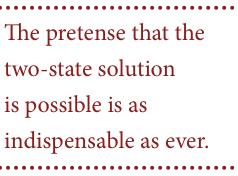
Of course there will be no immediate start to the talks once Operation “Swords of Iron” is replaced by Jenin-style Israeli raids into the repulverized Gaza ghetto. What there will be are fruitless talks, and talks about talks, about such issues as who should represent whom, the agenda for discussions, where they will occur, the status of the Oslo agreements in setting the terms of reference, whether the goal of statehood will be agreed upon at the outset, whether prisoner releases, a settlement moratorium, or economic confidence building measures will be required before they begin, whether the future of expanded East Jerusalem will be included, who will control access to and security in Gaza while talks are underway, and whether Gaza refugees will be resettled in Sinai or the northwestern Negev.

So what attitude should we take toward the once-and-future “peace process” when it cranks up? What contributions can be made by those who take the Israeli-Palestinian conflict seriously, and who know that whatever initiatives are launched will grind to failure in three to four years? I recommend three things. First, take full advantage of American, European, and Arab enthusiasm and economic commitments to “build back better” as much of Gaza as possible while protecting and enhancing life opportunities for Palestinians in the West Bank. Second, correct past diplomatic debacles by insisting that President Biden’s policy mantra be honored from the outset, namely that whatever the outcome may be of negotiations, it must provide Israelis and Palestinians with “equal measures of security, freedom, opportunity, and dignity.” Third, we must do whatever we can to ensure that when the process fails it is seen to fail for the right reasons—namely, refusal by one or both sides to honor, or even take seriously, the principle that all those living between the Jordan River and the Mediterranean Sea have certain unalienable rights, including rights to life, liberty, and the pursuit of happiness.
(Dec 19, 2023)
Rev. Dr. Don Wagner
Rev. Dr. Don Wagner is a retired professor, author, and advocate for Palestinian rights. His most recent book, Glory to God in the Lowest: Journey to an Unholy Land, was published in 2022.
When the genocidal war on Gaza ends the needs of Gaza’s Palestinians must be met immediately through massive and consistent levels of food, water, medicine, and medical teams to treat medical emergencies. Israel´s plan to expel Palestinians from Gaza must be blocked. The critically ill, wounded, and those needing emergency medical treatment should be evacuated with the right of return to Gaza guaranteed. The illegal 17-year blockade on the Gaza Strip must be lifted immediately and construction of housing for up to two million homeless Palestinians and rebuilding of hospitals must be a priority. The Israeli military must be withdrawn immediately and an international peacekeeping force replace them. Negotiations for a comprehensive peace treaty must guarantee the end to hostilities by all sides and the treaty must include a demand for an international conference on the question of Palestine.
The next steps are crucial. The international community must address one hundred years of denying Palestinians their right to an independent state with full political and human rights.
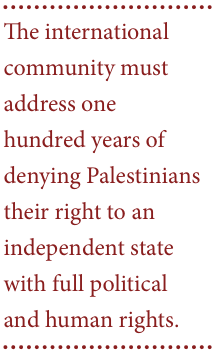
An international conference for justice and reparations for the Palestinian people must be convened through a broad coalition of nations from every continent through the United Nations General Assembly. The coalition should include leadership from NATO, the Quartet, and the Arab League, with representation from Africa, South America, Asia, and Oceania. The International Conference´s goals should include:
- Establishing the independent, democratic state of Palestine with the right of self-determination within secure and recognized borders, with its capital in East Jerusalem;
- Guaranteeing the right of return to Palestinian refugees and their families or compensation in accordance with UN Resolution 194;
- Affirming the right of Palestinians to choose their leadership in all negotiations. Encourage a revived Palestine Liberation Organization to represent the Palestinians composed of representatives from the Palestinian diaspora and those living within historic Palestine. The Palestinian Authority must be terminated immediately;
- Ending Israel’s military occupation of the Palestinian territories within a set time frame supervised by international observers. All settlements must be evacuated and made available to the incoming Palestinian refugees. Israeli citizens wishing to remain in the West Bank may do so as citizens of the new state of Palestine;
- Establishing an interim international protective force to ensure security for Palestinians and Israelis until the Palestinian state is officially declared;
- Rebuilding the Gaza Strip immediately funded by reparations collected from Israel and all countries that financed the hostilities following October 7, 2023; The Gaza Strip should be expanded to include territory adjacent to the present Gaza Strip with an expanded international border;
- Granting the state of Palestine complete jurisdiction over its airspace, electromagnetic field, resources on and under its territory, plus sovereignty over the natural gas and oil reserves off the coast of the Gaza Strip;
- Recognizing the state of Palestine as a full member of the United Nations with all the rights, privileges, and responsibilities granted to member nations;
- Convening the International Court of Justice and the International Criminal Court through separate legal procedures to fully investigate possible war crimes, including the crimes of apartheid and genocide.

Often overlooked is the need for a well-coordinated global network of non-governmental agencies from every continent. The movement should be sponsored by an official United Nations organization such as UNESCO or the Division for Palestinian Rights and provide for popular education and advocacy at the grassroots on a global level with goals designed to protect and defend Palestinian human and political rights.
For over 100 years the colonial powers have supported Israel´s military strategies including the theft of land, mass murder, and ethnic cleansing. All military strategies and negotiations have failed. Professor Einstein once stated that “insanity is doing the same thing over and over and expecting different results.” It is time to end the insanity and transition to diplomacy and various forms of nonviolent advocacy at the global level to ensure a just and lasting peace based on equality, security, and justice for all citizens in Palestine and Israel.
(Jan 7, 2024)
Beyond October 7th: Notes From a Jewish Theology of Liberation
Marc H. Ellis

In 1984, I made my second trip to Israel, this time to meet Palestinians. My first travel was in October 1973 on a dare from my Hebrew School teacher after I mentioned Palestinians to him. I wanted to know if he had met any on his travel there after the 1967 war. His anger was palpable. It made me curious. Why was he so angry?
I was alone. I traveled here and there to see what I could see. I didn’t have any grand ideas about Israel, pro or con. In large part, like most American Jews, I was mostly ignorant and naïve when it came to Israel.
My travel there coincided with the October 1973 war. On the ground it was an intense time for all involved, including me. I learned a lot from that experience. About Israel. About war.

Thus October 7, 2023, was an anniversary of sorts for me, of fifty years of observing Israel-Palestine in one of its many phases of conflict, occupation, and war. But it was after my 1984 trip, having met Palestinians in Jerusalem, the West Bank, and Gaza, that I knew I had to find my voice for what I had seen on the ground. People who looked like me, Jews of European descent, were on top. Arabs – as I called Palestinians then – were on the bottom. Something was wrong. What was it?
I began by writing an essay on what I had witnessed firsthand. Could Jews being up and others being down be right and just?
I didn’t have an agenda. I saw a reality on the ground that I found unjust. It was as simple as that.
In 1985, I published my first article as a prelude, two years later, to a book-length study, Toward a Jewish Theology of Liberation. My book was published before the first Palestinian intifada and in 1989 a second edition was published with an afterword, “The Palestinian Uprising and the Future of the Jewish People.”
My question in a Jewish theology of liberation was whether our newfound empowerment in Israel and America had liberated us. What did it mean for Jewish history to have shifted from being oppressed in so many ways, culminating in the Holocaust, to becoming a community so intimately and inextricably involved in oppressing the Palestinian people? Could we claim liberation while oppressing others?
My answer was that this newfound power had done just the opposite: It had enslaved us in various ways – from projecting macho-militarism, to expropriating the life and land of the Palestinian people, to supporting policies and governments around the world that also oppress others.
Therefore, in oppressing Palestinians and supporting others who thrive off oppression, what kind of witness were we embodying to ourselves, to others? Had we come to the end of ethical Jewish history?
I concluded that our Jewish ethical tradition was in danger of being squandered. It seemed to me then that there was no future for Jewish life and Jewish history by ignoring these facts on the ground. I still believe that today.
Many years have passed since I began this exploration. I thought I had seen it all. Now this assault on Gaza changes all our calculations, or it should. The most obvious need is for a ceasefire. It is more than urgent.
I wonder, though, if that were to occur if everything would then return to “normal” – another rebuilding of Gaza, another series of negotiations, and further integration of Israel into the Middle East national security state zone.
The task at hand is to move beyond this formula and seek a genuinely just future for Jews and Palestinians alike. With this task in mind, what does my original proposal of a Jewish solidarity with the Palestinian people, made many years ago in my Jewish theology of liberation, mean in light of October 7 and after – specifically, with this new dimension of the Palestinian struggle and another level of Israeli violence becoming the norm?
First, on the Jewish side of things there can be no going back to a sense of Israel as innocent and redemptive. A Jewish theology of liberation, any Jewish theology or politics, must take this into account. It must ask if our Jewish witness to the world has ended, and if any and all connections with Israel should be abandoned.
Empowered Jews, what I have called the Constantinian Jewish establishment, remain strong. Empowered Constantinian Jews have and will continue to define what Jewish and Judaism means to the world. Progressive Jews, those who have been critical of Israel on occasion, have shifted either toward the Constantinian Jewish establishment or joined the third discernible Jewish group, Jews of Conscience. This movement has accelerated in both directions since October 7.

Yet the idea of Jewish unity has been a mirage for decades. Years ago I defined the Jewish world as one of civil war. Today, Jews of Conscience are more in exile than ever. Progressive Jews can now be seen even more as the left wing of Constantinian Judaism. October 7 and after has brought the Jewish civil war into the open. The rift widens further each day.
Neither Jews nor Palestinians can retreat to old categories, whether that means sweeping what has happened and what is happening under the cover of the Abraham Accords or any other previous accord or proposal, or by hiding behind heightened rhetoric. For example, a one-state solution may be the eventual outcome, but right now it is more distant than ever. Indeed, decolonial ideology and politics, currently fashionable in academic discourse, may be the road ahead. But currently everyone involved is asking the powers that be, colonial or otherwise, to rescue Israel and Palestine from the abyss that has swallowed them.
Mere survival is on the table for Palestinians in Gaza. The reestablishment of ordinary life is of the utmost importance. Yet with the destruction that surrounds them, how long would that take and what would ordinary life look like? Right now it seems hard to imagine.
Normalization of the political scene in the Middle East is the sought-after objective by countries there, lest the region move further into conflict than it already has. Yet most of the plans floated, if implemented, seem to be fig leaves. Behind these are attempts to contain Palestinian aspirations for a real state of their own and the freedom to which they aspire. Hard questions abound and deserve unflinching answers. For instance, the thought is often expressed that a future Palestinian state must be demilitarized, as if those demanding this are themselves demilitarized or striving to be. In a demilitarized Palestinian state who would guard its borders? An occupying army or an international force? As if Palestinians would consent to live under any occupying force. And what do the recent comments of a high-ranking Saudi official mean that normalization of relations with Israel is now dependent on “real” movement toward a Palestinian state? What would that Palestinian state look like? What does “movement toward” mean? Would Palestinians govern that state like any other government governs? On all counts I am doubtful.
Moreover, because of the history toward Jews in the West, no matter what Israel does in Gaza in particular and Palestine in general, and no matter what its criticism of Israeli policies may become, it is unlikely the West will pull the plug on Israel itself. Europe and the United States have too heavy an investment in their discourse and policies around Israel’s existence as a Jewish state. Hence Jewish prophetic voices who speak out against Israel’s horrific assault on Gaza are themselves being assaulted within Israel and the United States. Palestinian voices outside Palestine are also being censored.

The Israeli occupation of Palestine, already permanent, however modified or extended, will likely continue indefinitely. Rather than see this as defeatist or a surrender, those in solidarity with the Palestinian people, Jews and others, must find a way forward within this framework – while maintaining, even widening, the critical framework of viewing the past and future of Israel-Palestine. There are things to be done within this permanence.
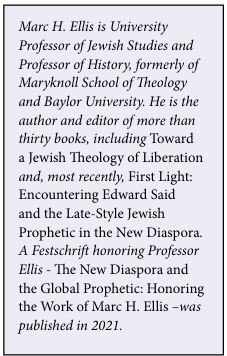
Those of us in solidarity have to believe and to work toward Palestine, whether in a one- or two-state configuration, and Palestinians must be seen as viable citizens and political actors, like citizens and political actors of any country, with the same virtues and faults. I cannot find this anywhere in the maps of those negotiating a Palestinian future. The inherent problem is that everyone is negotiating the Palestinian future except the Palestinians. That “negotiations for” rarely, if ever, work anywhere is obvious. Why anyone would think this could work for Palestinians is a mystery to behold.
History is open. It varies between nightmare and closeness. One never knows when a path forward will open. Those who want it closed will work toward that end. Those who seek an opening must continue on. It is our fidelity that we must pursue, with others. It is the only path we have.
Marc H. Ellis is University Professor of Jewish Studies and Professor of History, formerly of Maryknoll School of Theology and Baylor University. He is the author and editor of more than thirty books, including Toward a Jewish Theology of Liberation and, most recently, First Light: Encountering Edward Said and the Late-Style Jewish Prophetic in the New Diaspora. A Festschrift honoring Professor Ellis – The New Diaspora and the Global Prophetic: Honoring the Work of Marc H. Ellis –was published in 2021.
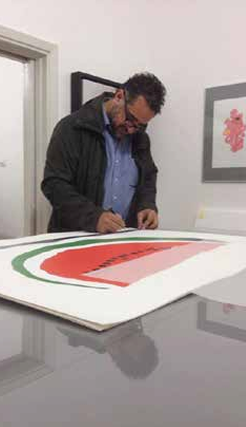
Why all the watermelons?
The iconography of the watermelon (Citrullus lanatus) in the Middle East dates back in history. With the help of the Palestine Poster Project Archives, a well-catalogued collection of Palestinian graphic arts, we’re pleased to share a sampling of how this indigenous symbol is rendered. Renowned Palestinian artist Khaled Hourani, shown here, discusses the watermelon as a response to Occupation…
In the 1970’s, When the Palestinian Flag was Forbidden
An Israeli officer told a group of artists, when they were about to form an association of artists, that it is forbidden to draw national symbols, including the colors of the Palestinian flag. One of the artists asked, “What about drawing a rose, using the colors of the flag, red, green, black and white? The officer replied: “It is forbidden, and forbidden even to draw a watermelon … !” The false accusation may have ended, but the occupation has not. I borrowed from this officer the idea for this artistic project, not to admire his ill imagination, but to commemorate his prohibition.
In 2007, I produced the Watermelon flag for the Atlas of Palestine Project. After that, it went around the world.
In Appreciation of Robert Norberg: AMEU President, Supporter, and Friend
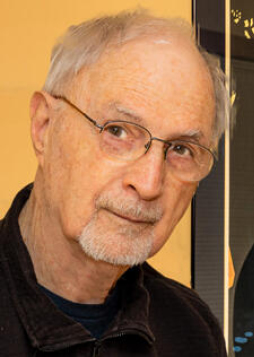
Bob Norberg, a longtime Board member and President Emeritus of AMEU, passed away on December 19, 2023, after a short illness. As his obituary in his hometown newspaper, the Lake City Graphic, noted, “Bob was a passionate and long-time advocate for Palestinian justice.” In addition to AMEU, Bob served on the board of ANERA.
Bob was born in Iowa and received a degree in journalism from the University of Minnesota. In 1958 he moved to Lake City, Minnesota, to become editor of the Lake City Graphic. It was there that he met and married his wife of 64 years, Shari, and they spent their years together in different locales, from Bloomfield, Iowa to Dhahran, Saudi Arabia to Washington, DC – and back to Lake City again. Bob managed and edited small-town newspapers in Minnesota and Iowa but spent most of his professional career in Dhahran and Washington as an executive with Aramco, first in public relations and later as Vice President of Government Relations.
AMEU was fortunate to have Bob in its ranks. Among his many initiatives, Bob got AMEU online, and the website he built continues to be maintained by his son, Jeff Norberg. As National Council member Anne Joyce said, “Bob was always very generous with both his praise and sense of humor. His family are no doubt bereft, but I hope their memories of this wonderful man will be of comfort to them.” National Council member Richard Hobson spoke of Bob’s memoir: “Ever generous and thoughtful, Bob sent me an inscribed copy of Bob Tales, which I will treasure always. It is a rollicking journey through Bob’s newspapering and Aramco career, replete with insight, truth-telling, and good Midwestern humor.”
Like so many of his AMEU colleagues Bob was distraught by the recent setbacks in the Middle East. At his suggestion (and with his generous support), AMEU will update one of its core documents, “Lest We Forget,” a chronicle of actions by Israel from 1949 to 2011 that call into question its strategic importance to the United States. Dr. Laurie King of Georgetown University is currently bringing the document up to the present day.
Bob is survived by Shari, three children, Scott Norberg, Robin Kennedy, and Jeff Norberg, a valued volunteer at AMEU, and seven grandchildren.
